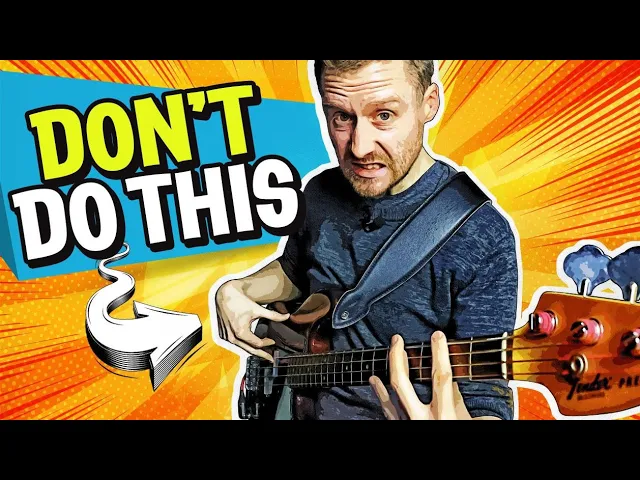As a beginner bassist, I made a lot of mistakes.
This was really frustrating but looking back now I can pinpoint 5 specific lessons that would’ve made all the difference to my playing had I learned them as a beginner.
So what are these lessons? What tips do I wish I learned when I was a beginner?
1. Learn Music Theory
When I first started learning to play bass, I totally neglected music theory. Because I was just learning to play songs along to records at home, I figured it didn’t matter if I understood what I was playing, what scales I was using or even what notes I was playing.
That all changed when I was put into a band at school. When our teacher said “this song is in C” or the time signature is “3/4” I had no idea what she meant and, as you might expect, I fell behind the rest of the class.
I’d hit a brick wall. There was no escaping the fact that music theory was something I simply HAD to learn.
Once I got over the embarrassment of not being able to participate in the class I took it upon myself to get to grips with theory and once I did, it blew my mind.
I learned about scale formulas which helped me learn the neck so much faster. I understood why it’s so important for the bass to be a foundation so I played better in bands. In short, my musical life was greatly enhanced by learning theory.
But there’s an important caveat to this point which we’ll explore in tip two.
2. Play Completely By Ear
When I was a kid, the way I learned songs was from getting free TABS off the internet.
Whilst I was able to learn songs this way, I totally neglected the development of my ears in the process.
This lack of ear training lead to problems later in my learning too as I struggled to write songs, riffs and play the ideas I heard in my head.
So spending time totally disregarding theory and playing along to records just with your ears is crucially important, but this does open up a contradiction.
How can I say that beginners should learn theory but then also go on to say they should dispense with it and trust their ears?
This was something that I felt as a beginner too.
No doubt, I needed to know theory but playing but ear was something that I grew to enjoy. It became the reason I would actually pick up the bass.
As a beginner, this created a conflict of interest for me. There were things I wanted to know and things I needed to know.
And as the next two tips show, balancing these two needs would be very difficult.
3. Develop Your Technique
When I first started out not only was my technique awful but I actively avoided the advice I got from my teacher.
When he said “keep your wrists straight” or “don’t slouch forward” I ignored him. I always said “I have a technique that works for me”.
After all, I could play my favorite songs. And surely being able to play was more important than my wrist angle?
Now it was true that my technique did (sort of) work for me…. that was until my technique stopped working for me.
That’s right, soon enough my bent wrists and slouching shoulders resulted in an injury. And a bad one too.
I was forced to rethink the way I played.
I had to put in the hard yards to reshape my habits, redesign my technique and learn to play a new way that wouldn’t damage my body.
Was it worth it? Yes. Not only did I get past my injuries but I also became a much better technical player.
This was one of those things that I really needed to learn. And this was true of all kinds of technique like pick technique, slap, palm muting. Not just fingerstyle.
However, the technique practice was far from inspiring and a lot of the time, this lack of inspiration lead me into another mistake.
I’d skip practice.
Which gets us to point four.
4. Build A Practice Habit
Here we encounter a fresh conflict of interest.
When I was a beginner I was told that the best way to make sure you come back to the instrument to practice is to work on material that excites you.
Even spending five minutes a day on the bass will give you a taste for regular practice and that soon becomes a strong habit that won’t break easily.
But here’s the problem. What do you do if you need to practice something regularly that doesn’t excite you?
There’s no doubt I found my technique practice boring but I needed to work on it every day to make good technique one of my playing habits.
What we need is some way of synthesizing these two opposites. We need a way of working that allows us to combine what we love and what we need.
5. Practice On The Job
What do I mean by this?
If you think about it, the only reason we learn great technique is to play real music.
The reason we learn theory is to understand great music.
And the reason we develop our ears is to help us engage on a much deeper level with the music we play.
So why not use real music as a vehicle to practice both what we need and what we love?


Leave a Reply